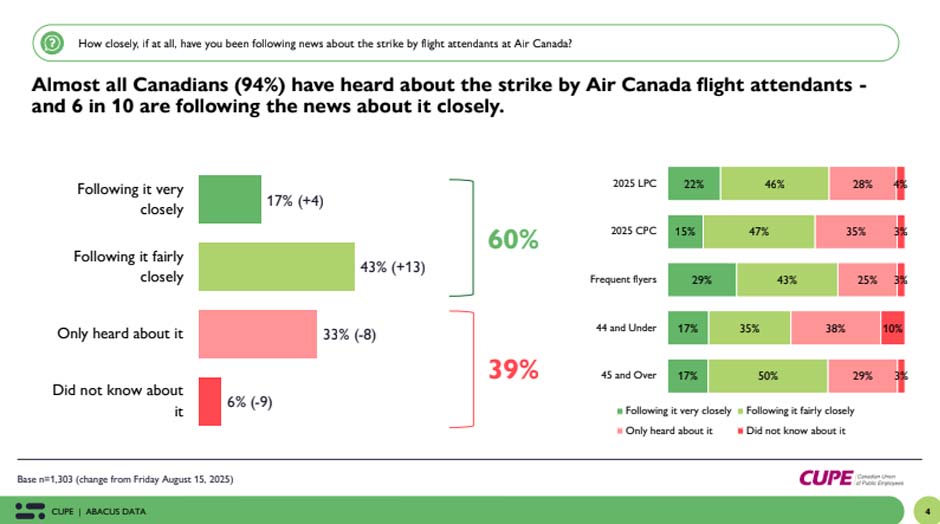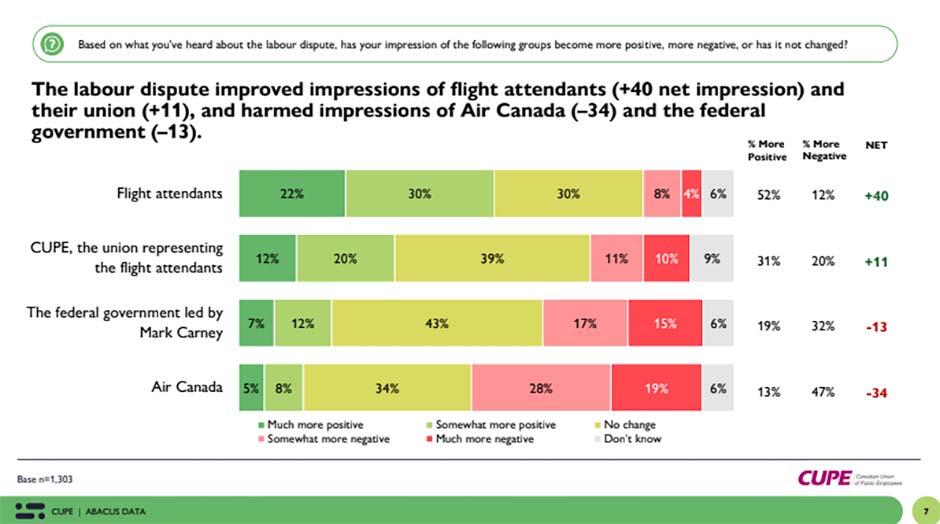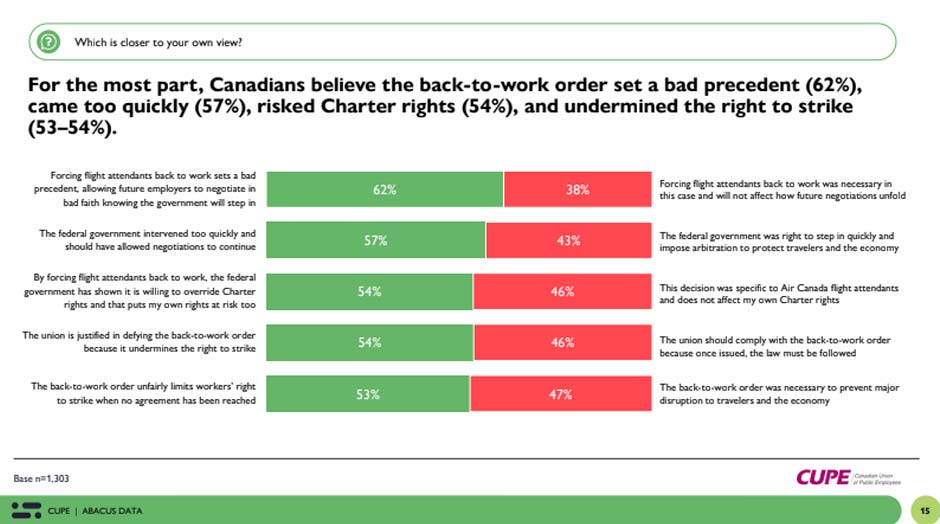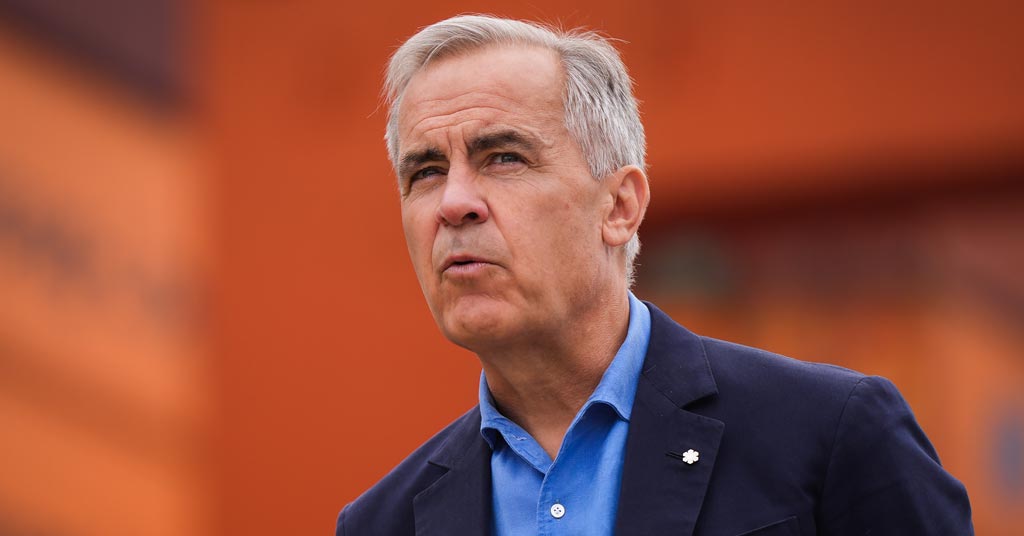News
Canadians sided with flight attendants over Air Canada and Mark Carney’s government – including Carney’s own supporters
by Luke LeBrun, Editor
August 20, 2025
Despite accusations that it intervened in the Air Canada flight attendants’ strike to support airline executives at the expense of workers, new polling data suggests the Carney government’s attempt to order flight attendants back-to-work only had the effect of increasing public sympathy for striking workers.
According to polling data newly obtained by PressProgress, one of the first snapshots capturing the fallout from the Air Canada flight attendants’ strike appears to confirm the Carney government’s controversial decision to order flight attendants back-to-work backfired both for the company and for the government.
The online survey of 1,303 Canadians, commissioned by the Canadian Union of Public Employees and independently conducted by Abacus Data on Monday, August 18, suggests Canadians paid close attention to the strike, with six in 10 respondents saying they were following news about the strike “closely.”

Source: Abacus Data / CUPE
Overall, 66% of respondents said they sided with the flight attendants whereas only 12% supported Air Canada management. Support for the workers increased by seven points over the weekend, after the government ordered flight attendants back-to-work.
“The poll clearly indicates that sympathy for the flight attendants grew as the dispute unfolded, while Air Canada and the federal government have both seen their reputations take a hit,” Abacus Data CEO David Coletto told PressProgress.
“The events of the weekend, the strike, the quick intervention and the visibility of the issue clearly moved public opinion in the workers’ favour,” Coletto said, adding that this “public pressure likely pushed Air Canada back to the bargaining table and helped get a deal done.”
Coletto’s polling data suggests the public support for the flight attendants grew as a result of the labour dispute, with a net +40% of respondents indicating their impressions of the flight attendants had improved.
By contrast, impressions of Air Canada worsened, standing at net -34%, while Carney’s government came away from the strike at net -13%.

Source: Abacus Data
The findings appear to explain the subsequent change in tone in the public messaging from both Air Canada and the federal government.
After initially striking a combative tone with the union, Air Canada acknowledged Tuesday that it now recognizes “confidence has been shaken” and assured passengers it will be “working hard to fully restore their trust.” The federal government, meanwhile, announced it would be launching a probe into the issue of “unpaid work in the airline sector.”
Overall, Coletto says his data suggests Canadians are “divided” on the government’s decision to order flight attendants back-to-work, with 44% of respondents indicating they disagreed with the government’s back-to-work order and only 39% in support.
On a number of other questions, however, a majority of respondents agreed the back-to-work order has troubling implications for workers’ rights in Canada.
A majority (62%) said the back-to-work order “sets a bad precedent” by “allowing future employers to negotiate in bad faith knowing the government will step in.”
The poll found 57% agreed the Carney government “intervened too quickly and should have allowed negotiations to continue,” while 54% said the back-to-work order shows the government has “shown it is willing to override Charter rights.”
Another 53% said the back-to-work order “unfairly limits workers’ right to strike when no agreement has been reached.”

Source: Abacus Data / CUPE
Coletto notes the polling data also suggests many of Carney’s own voters questioned his government’s heavy-handed approach to putting down the strike.
“What’s notable is that even among Liberal voters, support for the government’s approach is soft,” Coletto explained. “More Liberal voters think it was the wrong decision than the right one, and many share the broader concern that the government intervened too quickly.”
“That signals some political risk for the Carney government.”
Overall, 47% of 2025 Liberal voters disagreed with the Carney government’s decision to order flight attendants back-to-work, while only 40% agreed.
Another 62% of Liberal voters agreed the government’s back-to-work order sets a bad precedent and allows employers to negotiate in bad faith.
On the question of whether the government’s intervention represents a broader threat to rights, Liberal voters are split: 51% of Liberals agree the government has demonstrated it is willing to override Charter rights, while 49% disagree.
“Even when the overall approval of the Carney government remains high, in this case, many of their own supporters question the choices it made,” Coletto said.
The online survey was conducted on Monday between 9:45 AM and 3:45 PM EDT. The margin of error for a probability-based random sample of the same size (a sample drawn from the overall population rather than from an online panel) is +/- 2.7%, 19 times out of 20.
Abacus Data is an accredited polling agency with the Canadian Research Insights Council.
Our journalism is powered by readers like you.
We’re an award-winning non-profit news organization that covers topics like social and economic inequality, big business and labour, and right-wing extremism.
Help us build so we can bring to light stories that don’t get the attention they deserve from Canada’s big corporate media outlets.

